Petr Jarchovsky, Csongor Kassai and Peter Bebjak The Teacher Interview
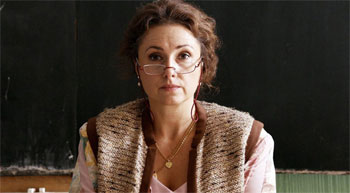
Ucitelka (Original Title)
Cast: Zuzana Mauréry, Zuzana Konecná, Csongor Kassai
Director: Jan Hrebejk
Rated: M
Running Time: 103 minutes
Synopsis: From Oscar-nominated writer/director Jan Hřebejk (Divided We Fall), The Teacher is a wildly entertaining black comedy inspired by the true story of a Communist-era school teacher who manipulated her pupils and their families for unprecedented personal gain.
The early 1980s, Czechoslovakia. At the start of a new term at a suburban high school, a seemingly empathetic and kind new teacher, the middle-aged Maria Drazděchová greets her class. She asks them to introduce themselves and share what their parents do for a living, explaining that it's important to know how their parents might collectively help the group. Soon after, she gradually begins to pressure both students and parents by seeking favours – grocery collection, handyman assistance, lifts and haircuts – and connecting them with special treatment in class and, most significantly, good grades.
Before long Maria's demands grow more complex and dangerous, so when a serious incident finally draws her unscrupulous behavior to her colleagues, the principal calls a secret meeting, seeking parents to sign a petition to move 'Comrade Drazděchová' on from the school. But her high connections with the Communist Party hang above everyone in the room, and it's soon evident that standing up for what's right may be much easier said than done.
With production design and cinematography that recreates the era to wonderful effect, The Teacher delivers a timeless and universal story of opportunism, bias and human dignity. Laced with wicked humour and standout performances, this rousing morality tale employs a delicate touch to skewer not only the complications of communism, but the human characteristics that ensure it never quite works out as expected.
The Teacher
Release Date: November 23rd, 2017
www.palacefilms.com.au/theteacher
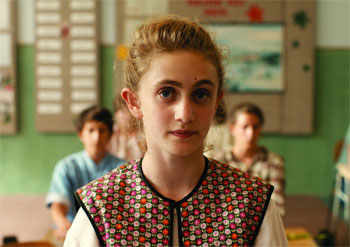 Interview with Petr Jarchovsky, Screenwriter
Interview with Petr Jarchovsky, Screenwriter
Question: This story of a manipulative teacher is based on your own experiences from primary school. Why did you decide to return to this story after such a long time?
Petr Jarchovsky: The situation that inspired the screenplay for The Teacher happened in the late seventies, and played an important role in shaping my view of the world. The fight against a teacher who misuses her position evokes moral dilemmas specific to the historical period and universally human. The basis is a true story that survived in our family mythology for its particular intensity. For many years it was brought up, retold, and remembered at various occasions. The events that took place at a clandestine parent meeting inspired me to write this specific variation on the courtroom drama.
Question: To what extent are the characters and their fates based on reality and to what extent are they fictional?
Petr Jarchovsky: Most of my screenplays are to some degree based on true events, and my characters have their specific models. The key dramatic situation in The Teacher was expanded with other partial moments that enrich the story, both real and fictional. So the result is a mixture of distilled real experience and my own invention.
Question: How did you perceive this manipulative and dictatorial behaviour of the teacher as a child? Were you afraid of her, or did she still maintain her kindly face? Were you one of the children who had to 'help" their teacher? Or perhaps your parents?
Petr Jarchovsky: In real life, the teacher wore the mask of maternal kindness, but her actions were a bit more primitive than those of her counterpart in the film. To make her character more timeless and plausible, we armed the teacher with greater sophistication, intelligence, and sex appeal. My mother worked as an accountant at the airport back then, so the dilemma faced by Danka Kučerová's father in the movie, played by Csongor Kassai, was her own dilemma, and it very closely mirrors real life. Danka's situation wasn't mine, but was based on a girl from our class.
Question: What do you think was the real motivation of the teacher?
Petr Jarchovsky: Similar to the motivation of the teacher in our film, if not identical. Just like our character, I think she was convinced that there was nothing wrong with this; it was mutually beneficial, the well-oiled system of quid pro quo that makes the world turn. The results of this model are destructive; unfortunately, it existed back then and exists still today.
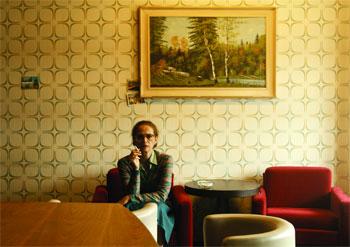 Question: Similar stories must be happening all over the world even today, making the story quite timeless. On the other hand, we now see pupils bullying their teachers. How much do you think the education system has changed in the last thirty years?
Question: Similar stories must be happening all over the world even today, making the story quite timeless. On the other hand, we now see pupils bullying their teachers. How much do you think the education system has changed in the last thirty years? Petr Jarchovsky: The system may have changed, but human nature remains constant. The Teacher is a drama of human attitudes, and tells a story about their conflict. It shows the mechanism that cultivates the courage to face evil, and how the brave are always pushed to the side-lines regardless of the context of the times. But you can't have a free society without brave people who have the courage to take a stand against injustice. This was just as true back then as it is today.
Question: Originally, the story took place in a school in the Prague suburbs. Then you relocated it to Bratislava, where the film was shot. Did this affect the story itself?
Petr Jarchovsky: When we decided to relocate the story to Slovakia for production reasons, it turned out that our shared past made it very easy to do. Nothing significant had to be changed in the story or setting. The energy that the Slovak crewmembers and actors brought to the film gave Jan Hřebejk and me many important and refreshing creative impulses, and we hope this came through in the final film as well.
Question: When you wrote the story, did you have any specific actors in mind? How important was the role of child casting?
Petr Jarchovsky: Casting was very inspiring, because it brought in many fresh Slovak actors entirely unknown to us, all of whom were all excellent. Their portrayal of our characters is not disrupted by the context of their other roles, making the characters easier to relate to. I try not to think of specific actors when I write, as that would just hinder our inspiration when we cast the individual roles. When I need to watch some phantom actors in my head, it's always the old greats – people such as Vladimír Menšík, Hugo Haas, Dana Medřická, Jiří Hrzán, Petr Čepek…
Question: Every creative artist has their main theme and several secondary themes. How important was this screenplay to you?
Petr Jarchovsky: When I'm writing as an author, and not for a producer project, I always choose a topic that the director and I consider important. You don't write a film during one flash of inspiration in a café like you would write a poem. Some stories take a lifetime to condense. Once the solution is saturated, and if the circumstances are favourable, you make a film. That's how it happened with The Teacher. The question you're asked most often as a screenwriter is this: 'How long did you spend writing the screenplay?" I've always been fascinated by this need to measure the creative process in time. In the case of The Teacher, I can answer that I have been writing it more or less for thirty-eight years.
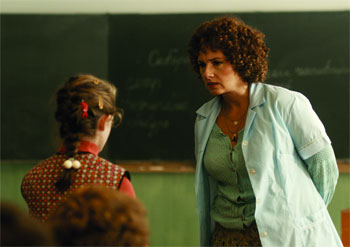 Interview with Csongor Kassai
Interview with Csongor Kassai
Question: In The Teacher, you portray the father of Danka Kučerová, the girl who bears the brunt of the teacher's bullying. Her father is subject to enormous pressure, but he's also one of the few parents who truly cares about justice and fair grades for his daughter. What was it like to play this character?
Question: Do you think, given the time in which the story takes place, that the parents did everything they could?
Csongor Kassai: I could think that, but I haven't been in this situation myself. When you're protecting your child, then everything else is likely to be pushed aside.
Question: This is your second collaboration with Jan Hřebejk, after Divided We Fall which was nominated for an Oscar. Is there something specific about his directing style?
Csongor Kassai: His style gives actors room for improvisation and he likes 'imperfect" acting. His approach to directing is probably best summarised by his quote: 'Please don't feel tempted to act!"
Question: What was it like to work with child actors who feel very authentic in their roles, such as your daughter in the film?
Csongor Kassai: Your question already contains the answer. When they feel authentic, they are an equal partner to a professional actor. That's all you need!
Question: Have you personally encountered bullying at any stage in your life? What do you think remains relevant today from The Teacher – the issues of manipulation, corruption, distorted relationships?
Csongor Kassai: Yes, I have experienced that. Looking back, I realise that it was the most important lesson I could get in my job. The issues you've mentioned have always been with us. Ever since the first man picked up a weapon and attacked an enemy.
Question: What are you currently working on, what are your next plans?
Csongor Kassai: In early June, my students at the Department of Alternative and Puppet Theatre at Prague's DAMU will be doing their final projects. I will also be touring Slovakia with several theatre shows, there's the Summer Shakespeare Festival in late July, and I will start on the Orfeus project that I'm doing with the Bubeníček brothers, directed by SKUTR.
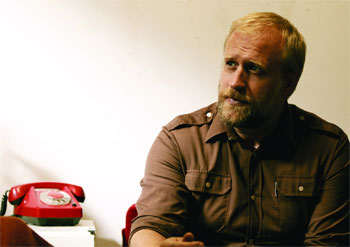 Interview with Peter Bebjak
Interview with Peter Bebjak
Question: In addition to acting, you're also a director; you presented your feature drama Čistič / The Cleaner at Febiofest, you co-directed Případy prvního oddělení / Cases from the First Department for Czech TV and the Nevinné lži / Innocent Lies series. Do you think of yourself as a director or an actor?
Peter Bebjak: I enjoy directing, it brings me satisfaction and it's how I make a living. Acting is a hobby. So I also enjoy that once in a while.
Question: How difficult is it to leave your director's hat behind when you're acting?
Peter Bebjak: Because I act once every five years, I think I do reasonably well. When I'm acting, I try to fulfil the director's wishes and keep my own ambitions under lock and key.
Question: What caught your interest in The Teacher and your role of Karol's father, whose wife has run away?
Peter Bebjak: Mr Littmann, which is the name of the character, is considered an enemy of the state, almost a dissident, and some see him as a hero. And yet he's just a loving husband who sacrificed himself for the happiness of his wife.
Question: What was it like to work with so many child actors, such as Marián Labuda's grandson who portrayed your son?
Peter Bebjak: It's like with any other actor. I don't care where he's from, I want to know what he can do. And Richard certainly has acting genes in the family. I enjoyed his professionalism.
Question: How do you see the character of the manipulating teacher? Why do you think she does it?
Peter Bebjak: Because of the power that she knows she wields, and because of the fear that everyone else feels.
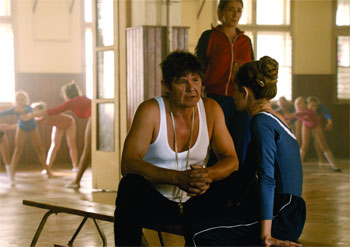 Question: Have you ever encountered something like what is shown in the film?
Question: Have you ever encountered something like what is shown in the film?
Peter Bebjak: Drazdechová is not just a person from the previous century, the previous regime. She represents all people who misuse their position and our Slavic willingness to be controlled.
Question: What was it like to play Mr Littmann, a person with a strong character and integrity? Even though he doesn't talk much, his character says a lot.
Peter Bebjak: Being on set with another director and watching him work, or better yet performing in his film, is a great experience. Particularly when it's Jan Hřebejk. And when you're meeting other great actors on the set, it stops being work and becomes fun. And I like fun.
Question: What are you currently working on, what are your next plans?
Peter Bebjak: Martin Žiaran and I are currently finishing a TV miniseries called Spravedlnost / Justice for Czech TV. In summer, I'll be wrapping up the period drama Četníci z Luhačovic, and we should also be finishing a movie called Čiara / The Line, about life at the Ukrainian-Slovak border. So it's quite a busy year.
The Teacher
Release Date: November 23rd, 2017
www.palacefilms.com.au/theteacher
MORE
- Mission: Impossible Fallout
- Glenn Close The Wife
- Allison Chhorn Stanley's Mouth Interview
- Benicio Del Toro Sicario: Day of the Soldado
- Dame Judi Dench Tea With The Dames
- Sandra Bullock Ocean's 8
- Chris Pratt Jurassic World: Fallen Kingdom
- Claudia Sangiorgi Dalimore and Michelle Grace...
- Rachel McAdams Disobedience Interview
- Sebastián Lelio and Alessandro Nivola...
- Perri Cummings Trench Interview



